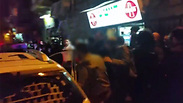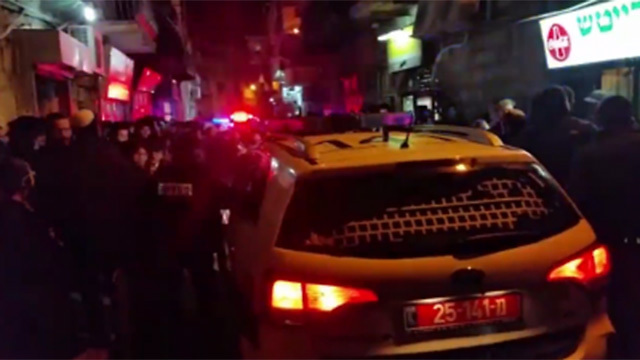
Scene of attack
Photo: Haim Shapira
Dozens of angry Haredi men were captured on camera attacking two IDF soldiers on Thursday night in Jerusalem’s Ultra-orthodox neighborhood of Mea Shearim.
The neighborhood is known for its fiercely anti-Zionist propensity with its inhabitants being staunch opponents to the mandatory conscription law which includes drafting members of the community into the IDF.
The images of Haredi soldiers becoming victims of this type of harassment from these radical strands have become increasingly commonplace with the implementation of the law.
Police rescue Haredi soldiers from mob (צילום : חיים שפירא)
Uniformed Haredi soldiers enter alleyways only to find themselves victims of attack by local zealots. On this occasion, security forces were called to the scene to extricate the soldiers from inflamed crowds.
While the central stream of Haredim and their leaders do condemn such violent instances, they oppose the draft of Haredi Yeshiva student.
Moreover, the main Ultra-orthodox parties—Shas and United Torah Judaism (UTJ)—generally remain silent and refrain from issuing their own condemnations.
One of the main reasons that the parties fail to comment on these attacks stems from fear of being depicted by extremists as compromisers who encourage Haredi service in the IDF, which could adversely affect them in a power struggle within the sector.
Despite the concerning images however, the integration of Haredim in the IDF has shown no signs of stopping.
The attack that took place on Thursday night occurred just after another step had been taken symbolizing increased Haredi integration in the IDF, with the swearing-in ceremony at the Western Wall of the first Haredi unit in the prestigious Paratroopers Brigade.
Two weeks ago, the Knesset discussed the phenomenon of incitement against Haredi soldiers following a string of physical attacks and other recorded incidents of harassment and shaming campaigns against them.
A manpower subcommittee from the Foreign Affairs and Defense Committee convened to hear evidence from uniformed and newly discharged soldiers and received a report from legal authorities about the struggle being waged to counter the trend.
On this occasion too, members of the Haredi leadership, which has remained silent for some time on the matter, was notably absent from the meeting. No rabbi nor political representative attended the discussions.
Committee Chairman MK Amir Ohana (Likud) voiced harsh criticism against the failure of Shas and UTJ members to show up and their failure to use their influence over the Haredi sector by supporting the soldiers and reining in the extremist elements among their constituents.
During the meeting, Yehiel Rotski, a Haredi soldier who extended his military service, described an incident in which he came under attack as he walked through a Haredi rally unconnected with the army.
Dressed in IDF uniform, he immediately became the target of attack and abuse, he told the committee.
“I found myself in an incited crowd with blood in their eyes,” he recounted. “I managed to escape to a side street and I asked a policeman if he would let me get away in his vehicle. He told me that wasn’t his job and that I should sort it out myself.”
So extreme has the situation become, Rotski explained, that he is unable to even visit his parents since he has become a well-known face among the extremist circles in the area.
“A large proportion of them from Jerusalem are dangerous to Haredi soldiers. You will receive insults and threats that I can’t even repeat,” he said.

















